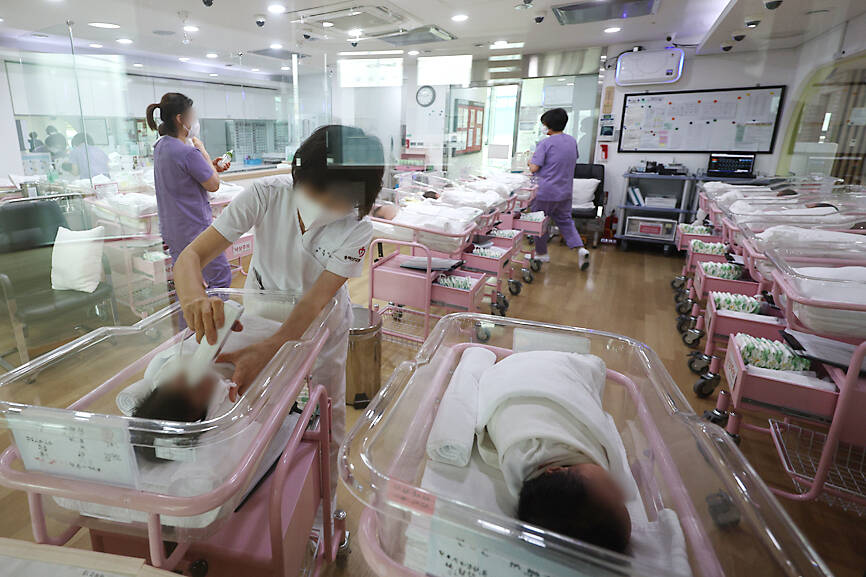South Korea’s fertility rate, already the world’s lowest, continued its dramatic decline last year, as women concerned about their career advancement and the financial cost of raising children decided to delay childbirth or not have babies.
The average number of expected babies for a South Korean woman during her reproductive life fell to a record low of 0.72 from 0.78 in 2022, data from Statistics Korea showed yesterday.
Neighboring Japan on Tuesday said that the number of babies born there last year fell for an eighth straight year to a fresh record low.

Photo: EPA-EFE / YONHAP
Japan’s fertility rate hit a record low of 1.26 in 2022, while South Korea’s is far below the rate of 2.1 per woman needed for a steady population and well behind the rate of 1.24 in 2015 when concerns about issues such as the cost of housing and education were lower.
Since 2018, it has been the only Organisation for Economic Co-Operation and Development (OECD) member with a rate below 1, defying the billions of dollars spent by the country to try to reverse the trend that led the population to decline for a fourth straight year last year.
South Korea also has the worst gender pay gap in the OECD, as South Korean women bring home about two-thirds of the income of men.
“Women typically can’t build on their experience to climb higher at workplaces because they are often ... the only one doing the childcare [and] often need to rejoin the workforce after extended leaves,” said Jung Jae-hoon, a social welfare policy professor at Seoul Women’s University.
“Having a baby is on my list, but there’s windows for promotions and I don’t want to be passed over,” said Gwak Tae-hee, 34, a junior manager at a South Korean dairy product maker who has been married for three years.
Gwak had considered starting in vitro fertilization treatment last year to try to have a baby, but ended up volunteering for work projects to improve her career prospects.
“I don’t know about elsewhere, but working two or three days a week doesn’t get you anywhere in Korean companies. I hope it’s not too late when I try next year or the year after,” Gwak said.
South Korea’s demographic crisis has become the top risk to economic growth and the social welfare system, with the country’s population of 51 million on track to halve by the end of this century.
South Korea has previously projected its fertility rate is likely to fall further to 0.68 this year. The capital, Seoul, which has the country’s highest housing costs, had the lowest fertility rate of 0.55 last year.

EXPRESSING GRATITUDE: Without its Taiwanese partners which are ‘working around the clock,’ Nvidia could not meet AI demand, CEO Jensen Huang said Taiwan Semiconductor Manufacturing Co (TSMC, 台積電) and US-based artificial intelligence (AI) chip designer Nvidia Corp have partnered with each other on silicon photonics development, Nvidia founder and CEO Jensen Huang (黃仁勳) said. Speaking with reporters after he met with TSMC chairman C.C. Wei (魏哲家) in Taipei on Friday, Huang said his company was working with the world’s largest contract chipmaker on silicon photonics, but admitted it was unlikely for the cooperation to yield results any time soon, and both sides would need several years to achieve concrete outcomes. To have a stake in the silicon photonics supply chain, TSMC and

IDENTITY: Compared with other platforms, TikTok’s algorithm pushes a ‘disproportionately high ratio’ of pro-China content, a study has found Young Taiwanese are increasingly consuming Chinese content on TikTok, which is changing their views on identity and making them less resistant toward China, researchers and politicians were cited as saying by foreign media. Asked to suggest the best survival strategy for a small country facing a powerful neighbor, students at National Chia-Yi Girls’ Senior High School said “Taiwan must do everything to avoid provoking China into attacking it,” the Financial Times wrote on Friday. Young Taiwanese between the ages of 20 and 24 in the past were the group who most strongly espoused a Taiwanese identity, but that is no longer

A magnitude 6.4 earthquake and several aftershocks battered southern Taiwan early this morning, causing houses and roads to collapse and leaving dozens injured and 50 people isolated in their village. A total of 26 people were reported injured and sent to hospitals due to the earthquake as of late this morning, according to the latest Ministry of Health and Welfare figures. In Sising Village (西興) of Chiayi County's Dapu Township (大埔), the location of the quake's epicenter, severe damage was seen and roads entering the village were blocked, isolating about 50 villagers. Another eight people who were originally trapped inside buildings in Tainan

SHARED VALUES: The US, Taiwan and other allies hope to maintain the cross-strait ‘status quo’ to foster regional prosperity and growth, the former US vice president said Former US vice president Mike Pence yesterday vowed to continue to support US-Taiwan relations, and to defend the security and interests of both countries and the free world. At a meeting with President William Lai (賴清德) at the Presidential Office in Taipei, Pence said that the US and Taiwan enjoy strong and continued friendship based on the shared values of freedom, the rule of law and respect for human rights. Such foundations exceed limitations imposed by geography and culture, said Pence, who is visiting Taiwan for the first time. The US and Taiwan have shared interests, and Americans are increasingly concerned about China’s